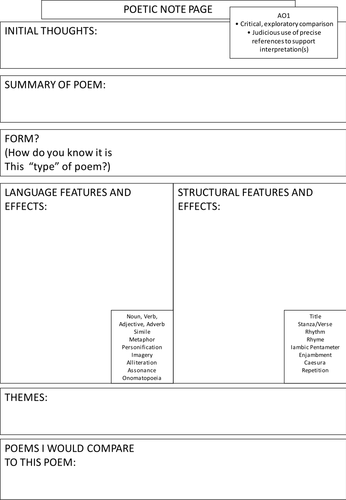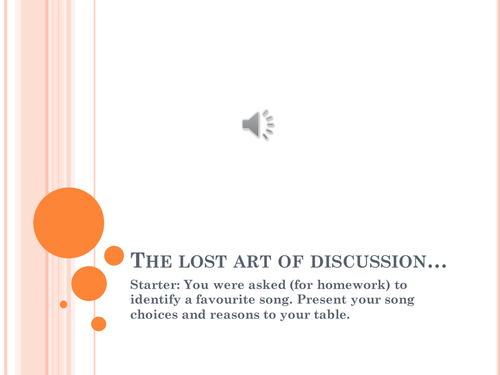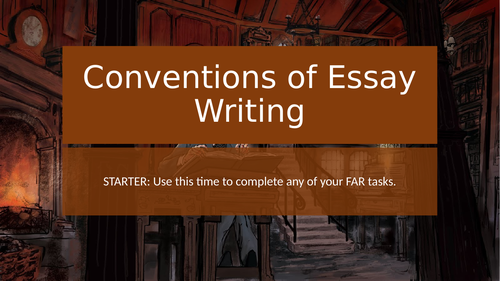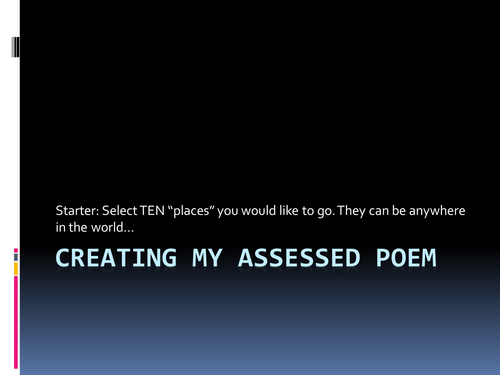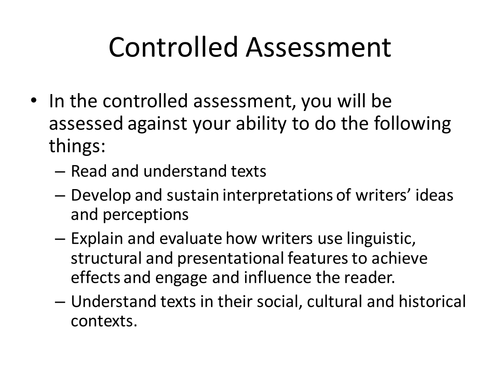
228Uploads
563k+Views
1397k+Downloads
English

Universal Key Stage 3 English Spreadsheet
A simple spreadsheet that is designed to track the progress of an entire KS3 cohort from Year 7 to the end of Year 9.
I have LOCKED each of the TABS of the spreadsheet using the NAME OF THE TAB itself (minus the spaces and as it appears with capital letters and numbers). This will stop any of the codes being deleted accidentally.
Hope this saves people some time.

Year 7 (KS3) Introduction to Poetry Unit of Work
A collection of resources I have used to introduce KS3 (specifically year 7) students to poetry with a view to them writing their own anthology, and exploring an unseen poem.

AQA English Literature DNA resources
There doesn't seem to be much out there for DNA, which is a shame really as it's a great text to study. Attached are ALL of the DNA resources I have created; hopefully this will give you a few different ideas and starting points.
This is a mish-mash of resources from three years of teaching this text across two schools. Some organising and sifting-through is needed here.

AQA Poetry Cluster 2 Revision Booklet - Power and Conflict Poetry
An 84 page long booklet that provides you with the following:
A thematic table
A section for each poem where you can find a copy of the poem, a notes page (complete with helpful guidance), generic revision and exam questions and a response page
A comparative table
A copy of the mark criteria
I have also included the documents I used to make this just in case you want to make a different version yourself.
Enjoy, and be poetic.
ALTERATION: I’ve updated the resource now - found one or two typos. Also, I’ve added in a grid that allows for a variety of themes to be “graded” in terms of how present a theme is: I’ve found this to be an engaging way of getting the students to compare. Finally, I’ve added a small section at the end about the different types of poetic forms.
Bundle

KS4 Creative Writing Pack
A series of lessons and resources that all work towards making KS4 students better creative writers.

D6 Dungeons and Dragons: The Dark Forest (An Easter Mission Pack)
PREMISE: You’ve been summoned to the gates of the Dark Forest – a haunted woodland, home to numerous fell creatures and twisted forms. The forest shifts and twists constantly, making it impossible to map. However, you and your adventuring kin will step into this shadowy land as the fate of Easter rests upon your shoulders. The Easter Bunny has been possessed! You’re job is to find him and drive out the demon. It’s a tough job, but someone has to do it…
Ok, so I kind of got carried away the whole Dungeons and Dragons thing and went and made myself an Easter Mission Pack. Also, as I had such success using my Christmas one, it felt like the right thing to do.
I include a lot of literary characters and locations in this one too.Here's the full list:
Hagrid
Aragog
Voldemort
Dracula
Frankenstein's Monster
Willow (from Buffy)
Treebeard
The Watcher in the Water (From Lord of The Rings)
The Balrog
The Wall (from Game of Thrones)
The Ringwraiths
It all seems to fit together.
Also, I include in this pack a whole-class presentation so you can do a guided creative writing lesson with a class or a large group. Either way, I am really looking forward to teaching this.
You will need to encourage all Dungeon Masters to be creative in how they manage the conflict situations.
This, is going to be great fun to teach...
PS - with the whole class presentation, clicking the main background image acts as the link to the next slide via the "secret paths" without flagging it up to students.
PPS - I've also included the first lesson - available for free elsewhere - otherwise it gets a bit complicated.

Discussing and Listening
Four lessons that focus on improving your students abilities surrounding discussion and listening - somewhat lost art forms. Numerous discussion topics at group and whole class level.

AQA English Language P2: Section B (using A Christmas Carol)
A series of lessons designed to make sure students have a clear understanding of the “basics” and the “developed” skills and techniques required for EACH of the possible text types they could meet in Section B of the English Language Paper 2 exam. Because my lot were taught A Christmas Carol (and I was trying to kill two birds with one stone by revising this at the same time…), the tasks are all focused on writing within the world of Scrooge. To that end, they may require some editing on the part of the user - hence the reduced price.

AQA English Literature: A Christmas Carol Method Focus Essay Builder
My year 11s were STILL struggling with how to frame a method, so I came up with this stand alone lesson. The idea is that, having reviewed the slide where the methods are explicitly identified, the students will see that a method and a quotation are not the same thing.
This was a successful lesson.
UPDATE: I repeated this process with a bottom set year 10 class where I was even more specific. This was also a successful lesson, so I’ve included it.

AQA English Literature: Romeo and Juliet Method Focus Essay Builder
Similar to a lesson I posted on A Christmas Carol. After a bit of a warm-up, the crux of the lesson is focused on establishing concepts then explicitly showing students HOW to identify methods - again, some still confuse quotations and methods - before pointing them at an exam question.
UPDATE: I repeated this lesson a few weeks later with a different extract, but backing off a notch in terms of explicitly identifying methods.

AQA Power and Conflict Poetry True or False Statement Generator
A useful little resource that can be a starter/plenary element in your lessons. The spreadsheet generates ten randomly selected true or false statements from a bank of over 260. Each of the power and conflict poems is covered and there is the scope for you to add in your own or edit the statements that are there.
I released this to my year 11s as a revision tool and they found it very useful.
Additionally, I have included a blank copy of the spreadsheet so you can create your own ToF statement generator.

AQA Conflict and Power Poetry Revision (mini-scheme of work)
5 Lessons and supporting resources that assist with the revision of this particular unit of the AQA English Literature Examination.
I cover the following poems (my students identified these ones as the toughies):
The Prelude
Exposure
Remains
The Emigree
Kamikaze
Each poem has a revision style lesson (it assumes prior knowledge of the poem on the part of the student, but they also make good starting points if you are cracking through the poems at a fair old pace). Each poem also has a revision card attached - we use these as tools in their own right, and I will be creating one for each of the poems soon enough.
The unit finishes on a GCSE style question where they have to compare Ozymandias to one of the poems they have studied. Hopefully you’ll find this useful.

KS4: Creative Writing inspired by Saving Private Ryan
Material I generated for the old AQA style creative writing controlled assessments - it still resonates with the new AQA Paper 1 Section B style questions (inspired by images). You'll need a copy of the film and you'll need to alter the Learning Outcomes (they are all set against the old AQA English Language Coursework criteria).

KS3: Shakespearean Sonnet exploration and creative writing
I had a lot of fun with this unit of work. The premise is simple: to explore the Shakespearean Sonnet form and to create your own Shakespearean Sonnet.
There is a also a focus on spelling too.
Included in this pack is a lesson I have also sold elsewhere - just saying!

KS3: Exploring Poetry (Character and Voice section of old AQA Anthology)
I used these lessons with year 9 classes. They still adhere to the old AQA specification (they talk of bands). But, each lesson is a complete poem and will save you some work.

Writing to argue
Old IGCSE English specification resources. Someone, somewhere, might find a way to use these...somehow.
Bundle

AQA English Language Paper 1 Revision Pack (version 1)
Does what it says on the tin. A revision pack for the AQA English Language Paper 1 revision pack.

AQA A-Level English Language and Literature: Othello - Lesson 2 (Soliloquies)
My second lesson. Here, I focus almost entirely on ACT 2 SCENE 1 and Iago's soliloquies therein. The notes element of the power point pulls a lot of thinking together from across a lot of sources - you'll need these notes to flesh out the tasks. I tie it up with an exam style question at the end focusing on what we can infer about attitudes to women. Quite pleased with how this looks and how it goes.
Bundle

Creative Writing Bundle
A whole mash of creative writing resources - some paid, some not - all in one place!

AQA Power and Conflict Poetry Scheme of Work
One power point per poem and some associated skills. I teach the poems in the order in which they appear in the anthology (except Tissue; I put that one at the end).
I follow a pattern with the lessons and source the contextual information from the BBC Bitesize website (and a couple of other places when I get bored of them) - it makes sense as any student that misses out on something can go and find what they need relatively quickly. The material is readily available elsewhere, hence the relatively low price for so many lessons.
NOTE: I have upgraded these lessons now. I’ve moved away from endorsing the PEEL style responses - the exam reports indicate clearly this is the thing to do. Additionally, I have included much more of a focus on the POWER themes. Lastly, I have used these poems as a springboard to discuss gender issues - part of this is my attempt to narrow the gender gap at the top end of GCSE English achievement by trying to get the lads to be more engaged with the material.
These lessons are designed to work in tandem with my own version of the poetry anthology. At the moment, I have yet to upload the edited version but I shall do so soon. That being said, the power points wouldn’t take much editing to use them with the traditional AQA version. All of the original lessons are included just in case you are still using the PEEL method of building a response.




